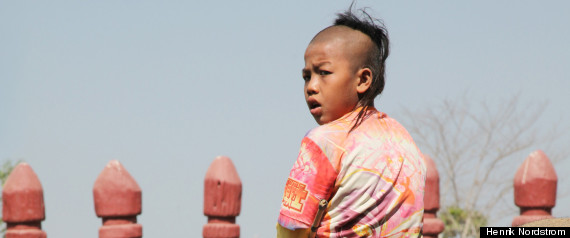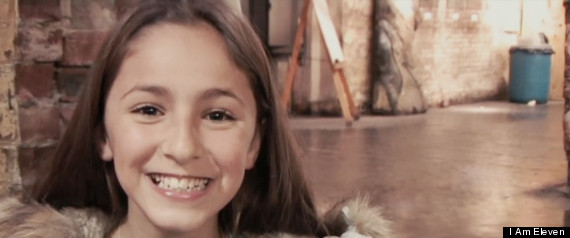Tell anyone you spent six years traveling the world interviewing 11-year-olds for a documentary, and the first two words you'll get are always the same: Why 11?
The opening scene of I AM ELEVEN explains that when I was 23, I started working in the newsroom of a major newspaper in Melbourne, Australia. On my first day on the job, I was confronted by images of devastation and loss. The Boxing Day tsunami had just hit, killing over 200,000 people across Asia.
A year later, I took time off work to go overseas for the very first time. I had recently been in a serious car accident, my dad had passed away from cancer, and I was depressed. I didn't want to lie on a beach somewhere; I wanted to shoot a film in every country I went to.
I thought back to my favorite age in life and why I loved it so much. For me, that was when I was 11: the world felt big in a good way, and it was at my feet. With so much more information available at their fingertips now than we had when I was young, I wondered, are 11-year-olds still happy and excited about inheriting this crazy world? Are they having as much fun as I did when I was 11? Are they hopeful?

I wanted to make something energetic, optimistic, universal and real. Little did I know I would spend the next six years exploring the world, directing, producing, shooting, editing and distributing my first film.
One mother approached me after seeing the film and said, "It's like a parenting book written by children." I love this feedback; it has really stuck with me. I am happy that the children in the film can provide inspiring insights to parents worldwide.
My camera took me from my first stop in Tokyo, to an Indian orphanage, to an elephant sanctuary in Thailand -- from the cobbled streets of Prague to Manhattan's Upper East Side. Kids opened up to me in twelve languages about topics personal and universal. Eleven-year-olds are still sorting out their priorities and opinions -- is love amazing or gross? Would you rather have a four-day weekend or a roof over your head? Do I want to be a pilot, or a dancer, or a nurse?
I really wanted the children I interviewed to be comfortable and empowered. The film is not about me, or other adults. You don't need me laying on the violins or delivering a "Godlike" voiceover telling you what is happening. It feels more authentic to let each of these kids just speak for themselves, and if you're really willing to listen to what they say, there are a lot of surprises in this film for you.

I decided early in the filming process that the easiest way to find 11-year-olds in foreign cities would be to go through schools. But I also thought that teachers might nominate the student with the highest grades, or acting experience, rather than the most interesting subject. I wanted the selection process to be more random, so I would hit the streets, go to markets, speak to locals and find children in all sorts of memorable ways. I gave myself three rules: they had to be 11, they had to want to be in the film (not all children in the media are the ones choosing to be in front of cameras, and I never wanted any of the children to be pressured into participating) and their parent or guardian had to give consent. Other than that, I was open to any child from any background.
As I filmed kids all over the world, I realized that 11 is a unique age in ways we don't always appreciate. I discovered that 11-year-olds really are standing at a cusp, a year of transition when they no longer see themselves as little kids anymore (even though some adults still do). They're old enough to form their own views of the world around them, and they have an independence and curiosity that's really inspiring. At the same time, they don't have the painful self-consciousness of teenagers, and are far less worried about the "image" they're projecting. They don't put up as many walls.
I later learned that biology backs up this theory. These are times when your brain makes more connections more quickly, and you're absorbing massive amounts of information and processing it rapidly. You might see it as the age you begin to become who you are. Alternatively, you could see it as the age when the future is most open.

What I discovered was that despite these children having loving families and communities around them, some of them relished the chance to be involved in my film. The invitation to sit and speak honestly about global issues with a complete stranger is not something every adult would be comfortable with, but I was impressed by how many 11-year-olds stepped up to the plate with pride. In my grandparents' generation, children were encouraged to be "seen and not heard." I think that in many parts of the world that has changed, and is changing. I believe that too often we as a culture focus on what adults can teach children, without acknowledging what we can also learn from young people. This was yet another reason why I feel so compelled to share I AM ELEVEN. I see it as an opportunity to encourage audiences young and old to sit down together, to engage with these children, their ideas, their concerns, their hopes, and then to discuss and dissect what we see.
It has been an amazing ride -- and just as interesting as the actual production have been the interactions with audiences during the release. Because I made the film for anyone who has ever been 11, or will soon be, we cast the net very wide in attracting very diverse audiences. Many parents come see the film with their children, and it promotes insightful discussions among families, educators, students and those interested in a global perspective on our world.
I AM ELEVEN has inspired and provided me endless insight, not only into our world, but also into our future. The audience response has also been overwhelmingly positive, and it has thrilled me to see so many people connect with a very DIY and low-budget documentary. We played for a record 26 weeks in theaters in Melbourne, Australia, and it is a dream come true to now release in the U.S.

I will never forget the reaction of a young girl from Cleveland, Ohio, who boldly put her hand up in front of hundreds of cinemagoers at the international premiere. She said, "What you have done is very interesting. Most documentary filmmakers choose to show us what is going wrong in the world, but you have chosen to show us what is going right. As kids we want to know about the good stuff!" I became quite emotional, and asked her age. "I am 11," she said. Of course she is.
Our company is called Proud Mother Pictures. My partner Henrik Nordstrom and I gave it that name. Our films are like our babies: we make them, raise them up, send them out in to the world and hope they have a great life and are warmly received and embraced by others.
So when people ask me, "Why 11?", I always want to ask what that age meant to them. I don't think you could watch I AM ELEVEN without finding your own answer.
We would love to share your story with the world. You are invited to take a photo of yourself like these featured on our website and we will include your memory here. www.wheniwaseleven.com
***
You can find out more about I AM ELEVEN here, and join the international community on Facebook, Twitter and Instagram #iameleven. Please share this story with someone you knew when you were 11.
 Like Us On Facebook |
Like Us On Facebook |
 Follow Us On Twitter |
Follow Us On Twitter |
![]() Contact HuffPost Parents
Contact HuffPost Parents
Also on HuffPost:
